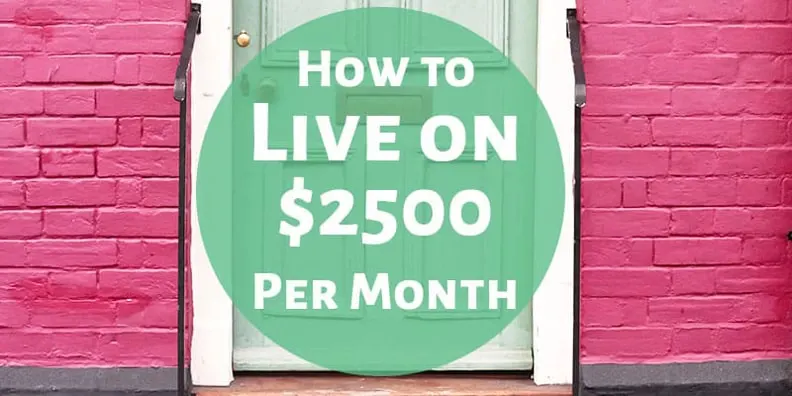For years, Austin and I lived on less than $1500 per month. My blog post showing our average monthly budget at $1500 per month is my most popular post, month after month.
Well, life has changed quite a bit since I wrote that post. Prices have gone up 17% in the last three years! (2021-2024)
Austin also finished his degree and got a job in his degree field. Because of his new job, we moved to a bigger (more expensive) city. Our budget has increased significantly, so I wanted to share what our current budget looks like now.
Like before, I’m still not sharing what our actual income is. Any income that we earn above our monthly budget listed below gets saved to an emergency fund, goes towards paying off debt, or gets used on house projects.
How to Live on $2500 Per Month
Mortgage: $1,010
We moved to a slightly bigger city with more expensive housing. Our mortgage has doubled! (Granted, our first home was a foreclosure which is a big reason why it was so cheap.) We are also a little lucky that we bought our new home when interest rates were reasonably low.
Utilities: $140
We’re still adjusting to the utility bills at our new house. I budget $140 for gas and electric. Since gas is higher in the winter and electric is higher in the summer, I think it will even out to about this much per month.
Phones: $80
We went with Google Project Fi and are happy with it so far. We paid for our phones up front and pay $80 per month for service for two on the pay-as-you-go data plan. We’re extra careful not to use much data. Since Austin has wifi at work and I’m always on wifi at home, it’s not too hard at all.
Internet: $50
I’m pretty sure we don’t know how to survive without internet anymore 🙂
Health Insurance: $402
Our previous health insurance was crazy-cheap through the government tax credit because our income was so low. Our current insurance is through Austin’s work and costs a lot more. It’s good insurance though, which is nice. I don’t think too much about the cost since it comes out of his paychecks.
Dental Insurance: $20
This is also through Austin’s work.
Car Insurance: $97
We’ve shared one car since we got married seven years ago and it has saved us so much money. It’s definitely not always convenient, but we’ll keep making it work for as long as possible.
Car Payment: $0 – finally
It was important for us to stay out of debt. So, we decided to purchase a used car that was affordable and practical. We have done everything we could to pay off the loan quickly. It helps that we only need one car and have been able to pay it off after years of monthly car payments.
Gas: $110
We live pretty close to everywhere we regularly go, which keeps this amount low. Plus, a small efficient car helps too! That really helps with gas prices hitting almost $5 a gallon…
Household Stuff: $25
I like to budget separately for food and other household stuff (like razors, toilet paper, trash bags…). It’s easier for me to keep a handle on our spending when I keep these categories separate. We are shopping around a lot more than we used to because some prices have really gone up.
Eating Out / Entertainment: $80
This is pretty low. Since moving, we’ve gone back and forth on how much to spend on eating out and entertainment. $80 seems to be a good number right now. We can go out to eat a couple of times and maybe see a matinee movie with this much. If eating out too much is a major weakness for you, find out how to break the habit!
It’s amazing how creative we’ve become when it comes to finding ways to entertain ourselves for free! Read our big list of free entertainment ideas.

Local hikes help keep our entertainment budget low
Groceries: $330
Can we all just agree that setting a budget and sticking to that budget are two very different things? I try to stick to a max of $70 per week for groceries. It can be so hard to stick to this budget and we occasionally spend a little more, for example for special meals. Remember, this is just food and doesn’t include any household supplies or eating out.
The two things that help me stick to my grocery budget most are meal planning and shopping at Aldi. Here are some popular posts that will help you meal plan and stick to your budget:
- How I Stick to a $70/Week Grocery Budget
- How to Eat Healthy on a Budget: 24 Healthy Foods Under $1 Per Serving
- Meal Planning for Beginners
I also use Ibotta to get money back on our groceries. They have rebates for fruits, veggies, and store brand foods (just search “any” in the app to find these rebates). If you sign up with my referral link, you will get $10 added to your account when you scan a receipt for your first rebate. You may have a receipt in your wallet right now that will work.
Sinking Funds: Why They Matter
To keep our budget pretty much the same month to month, we use multiple savings accounts. Each month, money is automatically deposited into each of the separate accounts listed below. Then when we need to spend money from one of the accounts, I transfer it into our checking account.
These sinking funds help us save up all year round for Christmas, quarterly bills like our water bills, or yearly bills like our life insurance bill. Sometimes we go months without needing to do anything to our car and the money builds up. Then it’s there when we need it.
If you want more info about sinking funds, these posts will help:
- What are Sinking Funds (Definition and examples)
- 3 Ways to Create Sinking Funds (aka: the logistics)
Water & Trash: $40
We get a quarterly water bill and transfer money into a trash collection account when needed.
Small car expenses: $20
This is enough to cover oil changes, maintenance, and our yearly registration fee. Any big repairs need to come from any extra money we make or our mergency fund.
Gifts: $25
We save $25 per month to go towards gifts throughout the year, like for birthdays, Mother’s Day or Christmas. It’s not a huge amount, so we usually don’t spend much on each event. You can read my list of gifts under $10 that people will love or 50+ cheap birthday ideas to keep your gift budget low.
We save for Christmas throughout the year so that December doesn’t become a super expensive month. It’s really nice to buy the gifts we need and then immediately be able to transfer the money to pay off the credit card! Debt free Christmas is the way to go.
Medical copays: $30
We save money monthly in this account to help pay any copays that come up. We also use it for over-the-counter medicine because cold medicine is kind of expensive and tends to blow my budget when one of us gets sick.
Small house repairs: $25
The money in our house fund goes toward any small repairs. Big repairs are usually unexpected and come from our emergency fund. Bigger house projects (non-emergency ones, like redoing a bathroom) get paid for with any extra money we make above our monthly budgeted amount.
Clothes: $30
This is a newer category for us. We used to only buy clothes when absolutely necessary and if we had extra money. $30 isn’t a ton but we found a great thrift store to help us stretch the money. I’ve got some tips for shopping at thrift stores here.
Allowance: $30
Austin and I each get an “allowance” of $15 per month. It’s not much but we used to not have any, so it feels like a bit of a luxury. It’s enough for each of us to buy something fun or we can save it up for a few months for something bigger.
Total: $2594.00
Let’s now look at our emergency fund.
Our Emergency Fund
I mentioned our emergency fund a few times but it’s not listed in our budget, so I wanted to explain. We keep a separate bank account with our emergency fund in it. Ideally, it would have six month’s worth of expenses saved up in it, but right now it’s closer to three. If our emergency fund is full, we don’t worry about it and let it sit as it is. If we need to add more to it, we do that with any extra money we make above our monthly budgeted amount.
When I first shared our $1500 per month budget, I got all kinds of comments saying, “this would never work for me because…” which is fine!
We all have different reasons for spending what we do. I think it’s important to realize that those reasons are all choices, though.
We could have spent a lot more on our house and had a much higher mortgage but we chose not to. It would be nice to have a higher allowance or a bigger grocery budget, and we probably could work that out, but our priorities are elsewhere. It can be super inconvenient to share a car but we make it work to keep our expenses down. It’s all about choices and priorities.
Tips on how to stay on track with your budget
Even if you have a number in your mind, staying on the monthly budget is not easy. Simple cravings a few times a month can disturb your budget. And if you make an impulse purchase, it’s game over. Here are a few tips that I follow to stay on track.
Sort out your savings first
With budgeting, you know how much money you’re spending every month and how much you can afford to save. Even before you start spending, set aside the savings and direct them to your savings account.
Follow the 50/30/20 rule
If you don’t know where to start, follow the 50/30/20 rule for budgeting. It helps you determine how much to spend and save. The 50/30/20 method states that you divide your income into three categories: needs, wants, and savings. 50% for needs, 30% for wants, and 20% for savings or paying off debts.
Use cash
Use cash for your week’s expenses (grocery and takeouts) instead of your credit card. We can all agree that credit card is used a bit too carelessly and we tend to spend money that we don’t have. When all you have is $60 in your wallet, it’s hard to spend it on things that you don’t really need.
Keep receipts and review them every week
We don’t realize which direction our spending habits are going until we’re hit with the credit card bill. Keep all your receipts in your bag and sit down to review them at the end of every week. If you’ve overspent, you’ll be able to adjust it through the rest of the month.
Use an app to help with budgeting
Instead of using a pen and paper and then losing it later, use a budgeting app. There are many great free budgeting apps out there like Mint and Zeta that help you have control over your money.
Share the responsibility
You shouldn’t be the only one in the family worrying about your finances. Make sure that the other family members are also on the same page. If your spouse and children are making an equal effort and cutting back a little, it can make a huge difference.
Look at the bigger picture
Temptations are hard to avoid. But when you feel like giving in, remind yourself why you started and what your goals are. Make your goals visual. If you want a car or a house, stick a picture of it on your fridge to remember the end game.
Treat yourself occasionally
You’ve been holding yourself back for a month now or perhaps months. It’s okay to treat yourself occasionally. Give yourself a pat on the back. It can be as small as a pizza takeaway or as big as buying that jacket you’ve been wanting. An occasional splurge is better than a frustration-induced spending spree.
Each person’s budget looks very different based on location, income, health concerns, priorities… There are so many variables!
I don’t share our budget thinking that ours is the right way to do it. I share it as an example of how to live on $2500 per month.
You Might Like These Posts Too:
- Grocery On a Budget: Save with this Cheap Grocery List.
- 13 Ways to Not Spend Money
- Frugal Habits We’ve Built into Every Day
Feel free to ask me any questions about our budget or budgeting in general in the comments! I try to answer them all.



Paula Boice
Monday 30th of September 2024
Amazing! Moved from San Francisco to Alabama to retire . Mortgage, ins, taxes on my modest old home 1,755, water 48, electricity 275 to 400, plus propane 1500 a year, trash $26, Termite bond $300 a year. No car payment gas 250. Health insurance $375 Groceries dog food cleaning supplies 250 to 400. No birthday or anniversary gifts . Sweet cards . Christmas 1 inexpensive gift . Always some in savings no matter how small . Once in while a lunch out and we always share. Trying life more simply is hard but we’re learning to continually cut back . Crazy increases in prices makes it hard on all.
Betty Fischer
Wednesday 19th of June 2024
Kudos to you for sticking to one car! My husband and I have been married for 40+ years, we started with 3 children between us and had 1 together. The cost of a second car plus clothing (bookkeeper) & childcare exceeded my monthly income. It didn't make since for me to work, we sold my car, a '68 Firebird, boy do I wish I still had that car, and I stayed home to raise the kiddos. We squeezed every penny until it squealed! We never had much to save & our kids grew up without extra activities. But they are now healthy, happy, productive, adults that have given us 12 grandchildren and 2 great grandchildren. As a reward for my hard work, when he retired my husband bought me my very own car with a small 401K from a previous job. Our years of budgeting & tracking have now made it a breeze to live on a fixed income. We still don't eat out or go to the movies, but we never had it, so we don't miss it. Keep up the good work!!
Lucy
Monday 4th of September 2023
I’d like to know what store you buy your groceries. I live in Orange County CA and can guarantee you that that amount is not enough for a 2 person household.
Cate
Friday 22nd of September 2023
@Lucy, also would love to see a California version of this, groceries for one adult and a child are easily 800-1000 a month. Not even going to get started on the $1800 rent...for a single bedroom
Bobbie
Tuesday 22nd of August 2023
It can be done, my budget is 1416.00 month, and includes my mortgage. all bills go out every month like clock work on the 3rd. credit score runs in the 700. got everything I need.
Mary
Sunday 27th of August 2023
@Bobbie, what state do you live in? Do you have help with any of your necessities? Thanks, Mary
Dee wapiennik
Tuesday 27th of June 2023
I did not see any money put aside for your retirement. Do you put money sesytfor that and how?